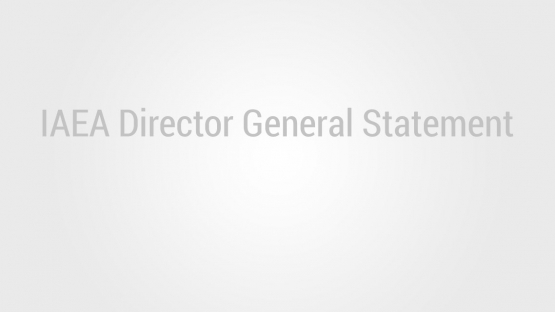As the number of States that conclude and bring into force safeguards agreements and Protocols Additional to these agreements increases, so does the ability of the Agency to provide assurance with regard to the peaceful nature of nuclear activities. But it remains a cause for concern that many States Party to the NPT have yet to conclude safeguards agreements with the Agency. At this time, 52 non-nuclear-weapon States party to the NPT still do not have comprehensive safeguards agreements in force as required under the Treaty. In my view, the coming months before the NPT Review Conference provide a timely opportunity for those States that have not yet done so to conclude and bring such agreements into force. In this regard, I welcome the decision of the Kingdom of Cambodia to submit its draft safeguards agreement to the Board for approval.
Only after an Additional Protocol enters into force will the Agency be able to provide credible assurance not only about the non-diversion of declared nuclear material but also about the absence of undeclared material and activities in a State. However, as I have stated on numerous occasions, the full potential of the Agency's strengthened safeguards system can be realized only through universal adherence to the Additional Protocol. I commend Peru for its decision to conclude a Protocol Additional to its safeguards agreement. It is, however, disappointing that two and a half years after the approval of the Model Additional Protocol by the Board of Governors, only 45 States have concluded Additional Protocols. Once again, the run-up to the NPT Review Conference offers States the opportunity to conclude Additional Protocols as a demonstration of their commitment to a strengthened safeguards system.
At the June meeting of the Board, I mentioned that, as requested by some States Parties to the Convention on the Physical Protection of Nuclear Material, an informal open ended experts meeting would be held in Vienna in November to discuss the possible need to revise the Convention. The meeting took place during the week of 15 November. It was agreed that a more detailed examination was required prior to any conclusions being drawn about the need to revise the Convention. The experts meeting decided to continue its work through the convening of a series of open ended working group meetings, the first of which will take place this coming February. The working group will analyse the nature and scale of illicit trafficking and the implications for physical protection. It will also consider the activities of the Member States and the Agency and other organizations in the physical protection field, with a view to better understanding and enhancing the contributions of these key actors. The working group will then make recommendations to the experts meeting, including recommendations on what problems, if any, necessitate amendments to the Convention. I will continue to keep the Board informed.
Since my previous report in September, the situation in the Democratic People's Republic of Korea (DPRK) has remained unchanged. The Agency is still unable to verify that all nuclear material subject to safeguards in the DPRK has been declared to it. We continue to monitor the "freeze" on the DPRK's graphite moderated reactors and related facilities, as requested by the United Nations Security Council, but the measure of co-operation we receive continues to be limited. And, despite many rounds of technical discussions, there is still no progress on important issues such as the preservation of relevant information which would enable the Agency to verify the DPRK's compliance with its NPT safeguards agreement. The 13th round of technical discussions with the DPRK will take place in Vienna next week. It is my hope that the DPRK will be in a position soon to expand the level of its co-operation, and also to normalize its relations with the Agency, possibly resuming its membership, so that the Agency can assist the DPRK, particularly in the field of nuclear safety.
There are only a few weeks until the new year. At this point, there is a need for heightened preparedness to respond to possible Y2K related complications. I want to emphasize, however, that this need will continue even after the roll-over into the new year because a critical date-related figure may appear even after the start of the year 2000 unless the problem has been corrected.
The Agency has continued its Y2K assistance programme by organizing missions to nuclear power plants and medical facilities which requested such assistance.
Last month, a contingency planning workshop was held in Vienna and attended by participants representing operators and regulators from 22 Member States. The exchange of views highlighted progress in the implementation of Y2K remediation programmes. There is, however, concern that some nuclear power plant operators are falling behind in their efforts to complete the necessary Y2K tasks owing to late actions and a shortage of funds. We believe that Y2K remediation and recovery actions on systems and equipment with a direct and immediate bearing on the safety of nuclear power plants have been carried out, thus mitigating the likelihood of complications at year's end. Y2K remediation work on other equipment of no direct influence on safety during the roll-over date, but of possible influence on safety and plant operation in the long term, has not completely been undertaken. It is therefore essential that Y2K actions be continued in 2000. The further support of donors in this regard will be required and the Secretariat has approached a number of countries to this end. The Agency is prepared to continue to provide technical advice and to serve as a forum to co-ordinate international assistance.
With respect to the Secretariat's own information technology (IT) infrastructure, all necessary measures, including an integrated simulation test, have been or are being taken so that the critical components essential to the Agency's work are Y2K ready. A Y2K control centre, which will operate from 30 December 1999 to 4 January 2000, will ensure that no disruption affects the Agency's systems and IT infrastructure.


